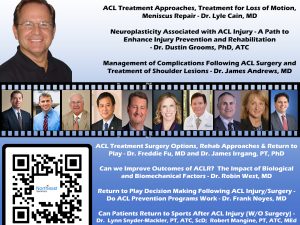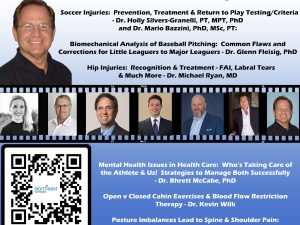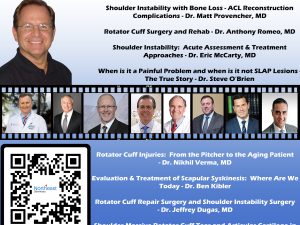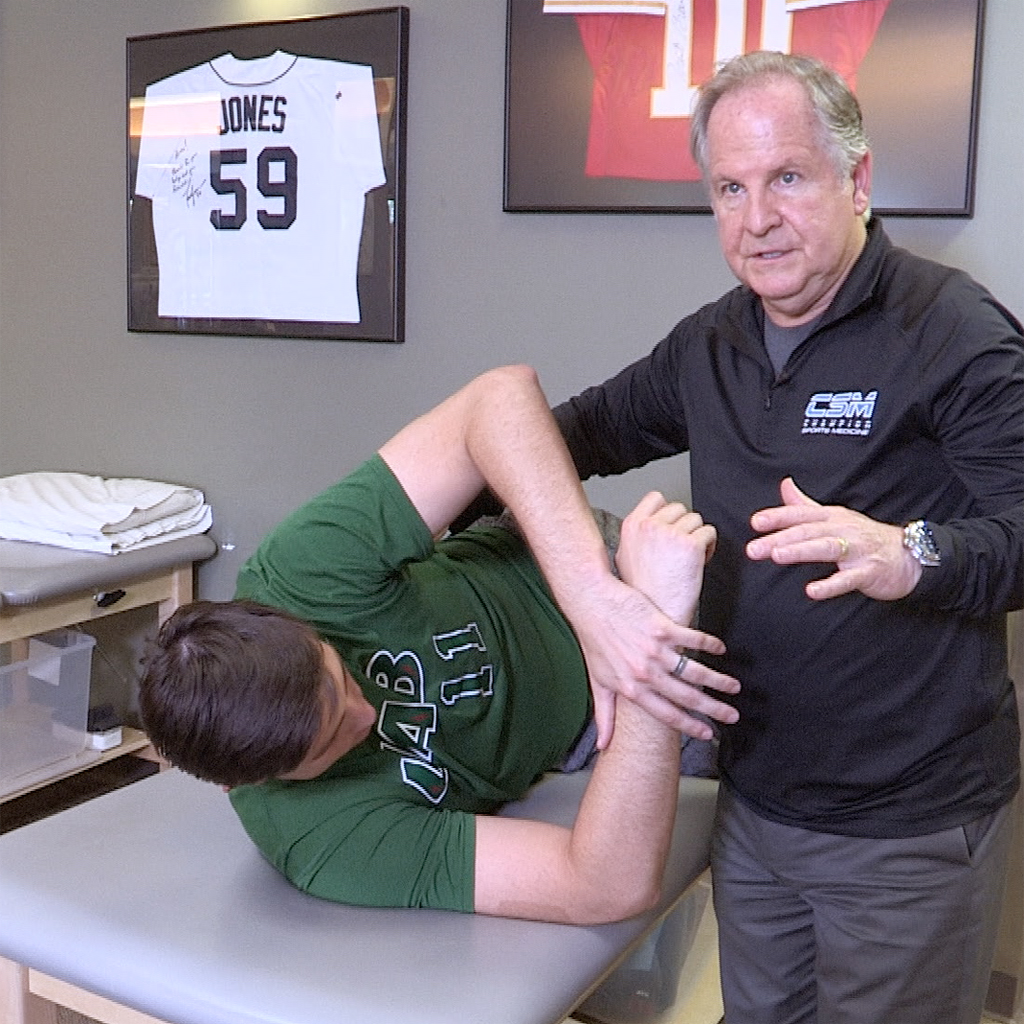



$449.00
Course Location: Residence Inn by Marriott Boston/Natick
- Description
- Event Details
- Course Details
- Fees
- Details
- Certifications
- Outline
- Objectives
- Additional Info
Description
The Evaluation and Treatment of Shoulder & Knee Injuries – New for 2024! course is designed to provide clinicians with the latest and most relevant information on treating the most challenging and unusual problems of the shoulder and knee joints. The course covers everything you need to know to offer comprehensive treatment options to your patients.
The course takes an evidence-based approach to treatment, discussing the latest research and over 600 actual case studies. You’ll learn through lectures, demonstration videos, hands-on laboratory sessions, and open discussions.
By attending the Evaluation and Treatment of Shoulder & Knee Injuries – New for 2024! course, you’ll have the opportunity to master new and effective evaluation and treatment techniques, which you can immediately implement into your practice. You’ll learn from the best in the field and be able to offer your patients the highest quality care.
This course will consist of 70% lecture (through video, PowerPoint, etc.) and 30% hands-on lab. Case studies of patients will be presented by the course instructor but also by course participants – evidence-based problem solving discussion will follow.
“I am excited to offer this new course to you. It is unique and engaging, and I believe you will enjoy it even if you have attended my previous courses.”
“I am honored to present this course to you. I am confident that you will enjoy the interactive and entertaining learning experience.”
–Kevin Wilk
Event Details
August 2-3, 2024 - (Friday - Saturday)
COURSE TIMES: Registration @ 8:00am,
Class Day 1: 8:30 am – 4:30 pm, Day 2: 8:00 am – 4:00 pm
Please note:
A digital course manual is provided and will be emailed the week of this event.
Course Location:
Residence Inn by Marriott Boston/Natick
1 Superior Drive
Natick MA 01760
508-651-5250
- Ample Parking - $10/night and Complimentary Parking for Local attendees
- Courtesy Block – Click to book your overnight room online (On or before July 2nd, 2024- 24 hrs XCL)
- Natick Mall in walking distance (Food Court)
- Logan Airport (22 Miles) Transportation: Natick Center & West Natick Commuter Rails – 2 miles/Uber/Lift
- Drivers: Just Off of I-90 Massachusetts Turnpike & I-95
Start date: August 02, 2024
End date: August 03, 2024
Start time: 08:00 a.m.
End time: 04:00 p.m.
Venue: Residence Inn by Marriott Boston/Natick
Address: 1 Superior Drive, Natick MA 01760
Course Details
| Instructor(s) | |
|---|---|
| Course Length | |
| Prerequisites | None |
| Platform | |
| Sponsors | Ermi, Hyperice, Multi Radiance Laser Therapy, Nutramax Laboratories Consumer Care, Inc., Winback, Bauerfeind, WellVu, Elvation, Joint Active Systems |
Fees
Register by July 3rd, 2024 at discounted rate or $449.00 & SAVE $50.00
(Full Price Both Days: $499.00)
Details
About Kevin Wilk, PT, DPT, FAPTA:
Kevin E. Wilk served as President of the Sports Section of the APTA from 6/2007 to 6/2010 and has trained more than 6,000 professionals through hands-on seminars and spoken to tens of thousands at more than 800 events worldwide.
Kevin Wilk has been a physical therapist, researcher and educator for over 39 years. Kevin is currently Associate Clinical Director and Co-Founder for Champion Sports Medicine (a Select Medical Facility) in Birmingham, AL. Dr. Wilk is also the Vice-President of clinical research and education for Select Medical.
In addition, he is the Director of Rehabilitative Research at the American Sports Medicine Institute in Birmingham and is Adjunct Assistant Professor in the Physical Therapy Program at Marquette University in Milwaukee, WI. Dr Wilk received his physical therapy from Northwestern University Medical School in Chicago, IL, and his DPT from Massachusetts General Hospital Institute of HealthCare Professions in Boston, MA.
Kevin Wilk’s Current Biography – Wilk Shoulder and Bibliography
Run Time: 2 Days (13 hours)
Attendees: Physical Therapists, Physical Therapy Assistants, Athletic Trainers, Occupational Therapists, M.D.’s and Students
Requirements:
- Lab clothing:
- Tank top or halter top to expose the shoulder
- & or shorts to expose the knee
- A mat (or blanket), a pillow, and a large towel for lab table.
- Also, bring a sense of humor and your brain for some new concepts & thoughts!
Course Evaluation: Yes
Certificate of Completion
Course Workbook (digital copy provided via email prior to start of the course)
Certifications
- Certificate of attendance is provided for Continuing Education
- Approved for 13 CE hours for PTs and PTAs in the following states;
AL, AR, CT, DE, HI, ID, IN, IA, KS, KY, ME, MA, MI, MT, NE, NH, NY, NC, ND, NV, OR, SC, SD, UT, VT, WA, WI, WY - Approved by the Texas Board of Physical Therapy Examiners for 13.00 CCUs for PTs and PTAs – expires 2-1-2025
- Approved by the TN Board of Physical Therapy for 13 CE hours
- Approved by the Illinois Physical Therapy Association for 13 CE hours
- MD Board of Physical Therapy Examiners (pending approval)
Northeast Seminars (BOC AP#P498) is approved by the Board of Certification, Inc. to provide continuing education to Athletic Trainers. This program is eligible for a maximum of 13 Category A hours/CEUs. ATs should claim only those hours actually spent in the educational program.
- (PLEASE NOTE: pending approval means an application has been submitted and is expected to be approved for CE in your state, once the approval notification is provided we will update this listing. Please know that any course we provide will be approved and listed on your certificate of completion)
Outline
Day 1: Shoulder: (8:00 am – 4:00 pm)
8:00 – 8:30 What’s New In Shoulder Rehabilitation & Surgery
8:30 – 9:00 What Am I Doing Different in Shoulder Rehabilitation
9:00 – 9:30. Clinical examination of the shoulder joint complex
9:30 – 10:00 Clinical Exam (Lab)
10:00-10:15. Break
10:15- 11:00 Non-Operative Treatment Rotator Cuff Lesions
- Impingement Lesion
- Internal Impingement
- Full Thickness Cuff Tears
- Calcific Tendinitis
11:00- 11:20 Surgerical Techniques to Repair the Rotator Cuff (Guest Faculty or Video Presentation)
11:20-11:50 Post-Operative Rehabilitation following Rotator Cuff Repair Surgery
- Factors which Effect the Rehab Program
- Is Slower Rehab Better
- Rehab programs based on patient variables.
11:50-12:15. Questions & Answers
12:15-1:15. Lunch
1:15-1:45 Current Concepts in Shoulder Instability (Management of Bone Loss,)
1:45-2:15 Non-Operative Rehab of Shoulder Instability (Traumatic to Congenital)
- Congenital Laxity to Traumatic Dislocations
2:15-2:45. Treatment of Loss of Motion (Adhesive Capsulitis) Lab Hands On
2:45-3:15 Good SLAP – Bad SLAP: What is it & Rehab Guidelines
3:15-3:45 What’s New in the Rehabilitation of the Overhead Athlete (Throwers)
- New concepts in rehab for various specific lesions: hyperinstability, TOS, SLAP, etc…
Rehabilitation of the Female Athletes Shoulder (Volleyball, Softball, Gymnastics, etc)
3:45-4:00 Case Studies – I have some & participants bring their cases
Open Discussion & Questions
Day 2: Knee Joint: (8:00am – 4:00pm)
8:00-8:30 What’s New in Knee Surgery & Rehabilitation
8:30-9:00 What Am I Doing Different
9:00-9:30 Clinical Examination of the Knee (Lab, Hands-On)
9:30-10:00 Non – Operative Treatment & Rehab Following ACL Injury
10:00-10:15 Break
10:15-10:45 Neurocognitive Rehab & Testing
10:45-11:45 Rehabilitation Following ACL Surgery (Reconstruction, Repair)
- Rehab Based on Variables (Grafts, Meniscus, Articular Cartilage)
11:45-12:45 Lunch
12:45-1:15 Rehabilitation Following Meniscus Repairs (Root, Ramp, Other Tears)
1:15-2:00 Rehabilitation of Patellofemoral Disorders
2:00-2:30 Rehabilitation of Articular Cartilage Lesions (Non-Op & Post-Op)
2:30-3:00 Rehabilitation for Knee Loss of Motion
3:00-3:30 Rehabilitation Following Orthobiologics: (PRP, Stem cell)
Do they work? And what is the rehab post-injection
3:30-4:00. Return to Play Testing – New Techniques – Reactive – Neurocognitive Testing
Case Presentations
Objectives
At the completion of the course the participate will be able to:
- Define the anatomy and biomechanics of the shoulder joint complex and the knee joint
- Design & demonstrate a complete clinical examination of the shoulder & upper quadrant & the knee joint including a thorough subjective history & physical examination.
- Interpret the information obtained from the clinical examination & functional assessment and develop a treatment plan.
- Demonstrate and organize a functional assessment for specific shoulder & scapulae disorders.
- Demonstrate an understanding of various shoulder joint & scapulothoracic joint disorders & pathologies.
- Design an evidence based medicine rehabilitation program for the specific types of knee injuries:
- ACL Injuries & Surgeries
- Meniscus Injuries & Surgeries
- Patellofemoral Disorders
- Osteoarthritis Knee Disorders
- Design an evidence based medicine treatment approach for various shoulder complex disorders.
- Design & perform a specific return to play or return to work functional assessment.
- Integrate the information presented in this course and demonstrate problem-solving skills through the development of treatment plans of specific case studies presented.
- Design & demonstrate a thorough rehabilitation program for specific shoulder injuries.
Additional Info
- Course-related products will be emailed for access the week of the event.
- Certificates of Attendance will be given to all participants and may be used for those who need C.E.U. verification and credits.
- Participants will be required to sign a Release of Liability prior to the commencement of this seminar.
- Location, Instructor, Dates and Cost of seminar are subject to change.
Portions Copyright© Northeast Seminars Inc. All rights reserved.
You may also like…
-
Course Length: 13.5 Hours
-
Course Length: 9.5 Hours
-
Course Length: 11 hours


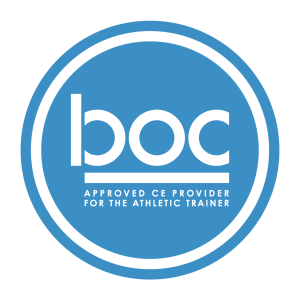 Northeast Seminars (BOC AP#P498) is approved by the Board of Certification, Inc. to provide continuing education to Athletic Trainers. This program is eligible for a maximum of 13 Category A hours/CEUs. ATs should claim only those hours actually spent in the educational program.
Northeast Seminars (BOC AP#P498) is approved by the Board of Certification, Inc. to provide continuing education to Athletic Trainers. This program is eligible for a maximum of 13 Category A hours/CEUs. ATs should claim only those hours actually spent in the educational program.